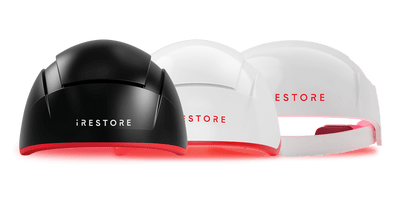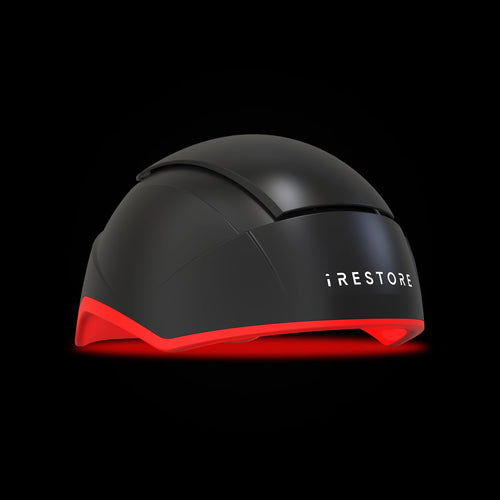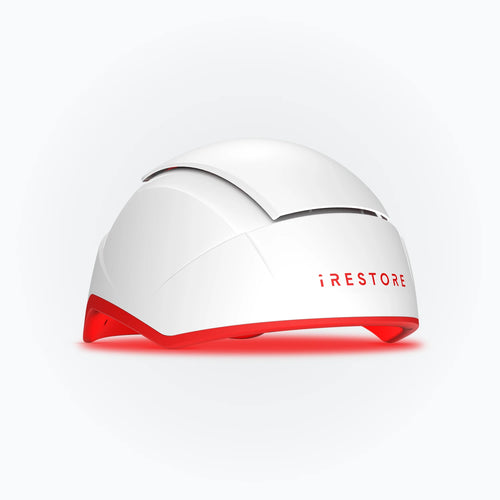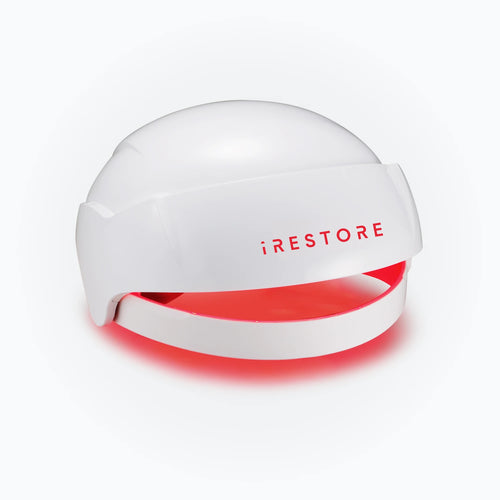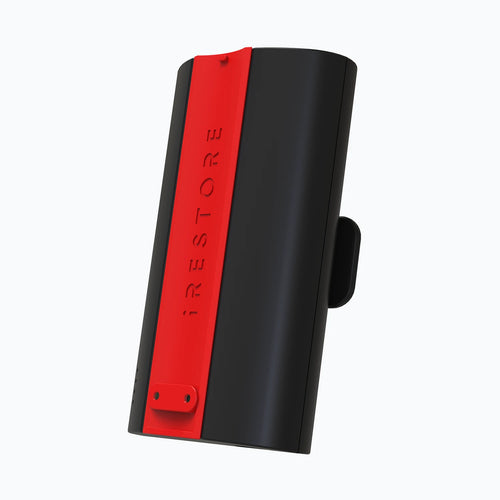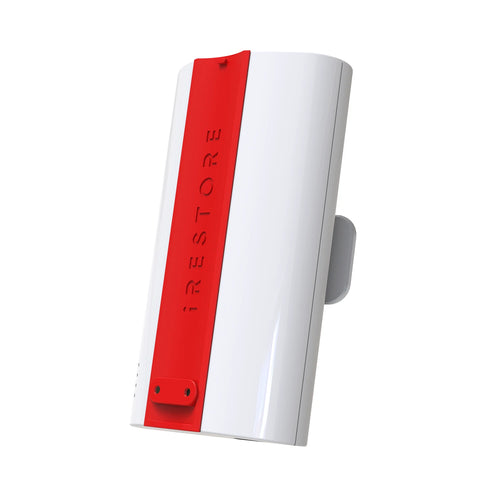Hard water won’t make your hair fall out overnight but it can cause the kind of slow, progressive damage that leads to thinning, breakage, and increased shedding over time. So does hard water cause hair loss?
According to a 2024 study published in the International Journal of Trichology, exposure to hard water for just 30 days made hair fibers weaker, rougher, and more breakage-prone compared to soft water. Another analysis in PubMed (2023) found that minerals like calcium and magnesium can accumulate on the scalp, blocking follicles and reducing the nutrients that fuel healthy hair growth.
This buildup doesn’t just dull your strands, it interferes with the natural hair growth cycle, making your hair appear thinner, flatter, and more fragile. If you’ve noticed dryness, tangles, or shedding after moving to a new city, traveling, or changing water sources, hard water may be the hidden reason behind the sudden change in your hair health.
How Hard Water Causes Hair Thinning and Shedding
1. Mineral Buildup Blocks Follicles
When your hair is repeatedly exposed to hard water, minerals like calcium and magnesium settle onto the scalp and hair shaft. Over time, this creates a layer of mineral buildup that blocks follicles, disrupts oxygen flow, and restricts the nutrients needed for healthy growth. As a result, hair becomes weaker and more prone to thinning and shedding.
2. Increased Cuticle Damage
Hard water minerals disrupt the natural pH of your hair and roughen the cuticle layer. A weakened cuticle can’t lock in moisture, making strands dry, brittle, and more likely to break mid-shaft. This type of breakage often mimics hair loss, because the hair appears shorter, thinner, and less dense even though the follicle is still alive.
3. Follicles Enter the Resting Phase Too Early
When scalp mineral buildup increases, follicles experience stress. This stress pushes more hairs into the telogen (resting) phase where they stop growing and eventually shed. While this isn’t permanent hair loss, it does cause noticeable diffuse thinning, especially if your water quality is consistently hard.
4. Hard Water Doesn’t Cause Permanent Hair Loss But It Makes Thin Hair Thinner
The minerals in hard water don’t kill follicles permanently. But they compound other existing issues like stress, hormones, poor sleep, or nutrient deficiencies making your hair appear thinner, weaker, and less resilient.
Signs Hard Water Is Damaging Your Hair
If your hair is regularly exposed to hard water, certain early warning signs often appear. These indicators show that your follicles and scalp are under stress and catching them early gives you a better chance to reverse the damage.
-
Hair feels unusually dry, rough or gritty, even after using conditioner. In one study hair samples washed with hard water showed higher surface roughness.
-
You notice increased shedding or more hairs in the drain. Though hard water itself may not cause direct hair loss, studies link it to weaker hair and increased breakage.
-
Presence of white mineral deposits or “chalky” residue on your scalp or hairline is a clear sign of mineral buildup from calcium and magnesium.
-
Damaged hair looks dull, lifeless and less voluminous because the cuticle is coated and cannot properly reflect light or hold moisture.
-
Your shampoo takes longer to lather, and your hair feels heavier or flatter after washing. The minerals reduce lathering and increase rigidity.
-
Scalp may feel itchy, irritated, or show signs of increased sensitivity. This is especially true if combined with other scalp issues like buildup or poor hygiene.
How to Protect and Restore Your Hair From Hard Water Damage
Hard water doesn’t cause permanent hair loss but it does create the perfect environment for mineral buildup, breakage, and hair thinning. The good news? With the right habits, you can reverse most of this damage and restore healthier, stronger hair.
1. Use a Clarifying Shampoo Weekly to Remove Mineral Buildup
A gentle clarifying shampoo dissolves calcium and magnesium deposits on the scalp, preventing them from clogging follicles. Once the mineral layer is removed, your hair can absorb moisture again reducing dryness and breakage.
2. Add a Scalp Exfoliation Routine
Scalp exfoliation helps remove dead skin cells, product residue, and lingering minerals. This improves scalp circulation, clears pathways for nutrient delivery, and supports a healthier hair growth cycle. Aim for a gentle exfoliation once every 7–10 days.
3. Install a Shower Filter to Reduce Mineral Exposure
A shower filter traps excess calcium and magnesium before they reach your hair. This simple change can dramatically reduce dryness, brittleness, and hair thinning caused by hard water. Most filters last 4–6 months and significantly improve hair manageability.
4. Hydrate Your Hair With Leave-In Conditioners and Oils
Since hard water roughens the cuticle layer, your hair needs extra hydration to stay flexible. Lightweight oils (like argan or jojoba) and leave-ins help seal moisture back into the strands, reducing the risk of mid-shaft breakage.
5. Support Follicles With Nutrient-Rich Foods
Your hair depends on nutrients like iron, zinc, omega-3s, and vitamin D to stay strong. Eating more salmon, eggs, nuts, spinach, and pumpkin seeds helps counter the stress that hard water damage places on your follicles.
How Red Light Therapy Helps Hair Recover From Hard Water Damage
Even if you eliminate hard water exposure, your follicles may still struggle to return to full strength. Mineral buildup stresses the scalp, weakens the cuticle, and pushes more hairs into the telogen (resting) phase all of which slow regrowth.
This is where iRESTORE’s red light therapy becomes a powerful, science-backed solution.
-
Re-energizes weakened follicles: iRESTORE’s red light therapy boosts ATP production in hair follicle cells, helping them recover from hard water damage and restart a healthier hair growth cycle.
-
Improves scalp circulation and reduces inflammation: By increasing microcirculation, red light helps deliver more oxygen and nutrients to follicles while calming inflammation caused by mineral buildup, supporting thicker, stronger regrowth.
-
Supports thicker, denser hair over time: With consistent use, iRESTORE’s FDA-cleared systems help extend the anagen (growth) phase, reduce breakage, and improve overall hair density, making hair look fuller even after years of hard water exposure.
Real People. Real Experiences.
At iRESTORE, nothing matters more than the results our users see in real life. Thousands of men and women who struggled with hair thinning, hard water damage, postpartum shedding, stress-related loss, or pattern hair loss have seen visible improvements in density, strength, and overall scalp health with our FDA-cleared red light therapy systems.
Many users report:
-
Thicker, fuller-looking hair within 2–4 months
-
Significant reduction in shedding
-
Stronger strands that break less easily
-
Healthier scalp comfort after years of irritation
-
Noticeable improvement in problem areas like the crown and temples

Conclusion
So, does hard water cause hair loss? Not permanently but it can absolutely weaken your hair over time. The minerals in hard water create a film on your scalp and strands, leading to dryness, breakage, shedding, and eventually noticeable hair thinning. This type of hair loss is usually reversible once you reduce mineral exposure and support your follicles with the right care.
By using clarifying treatments, improving scalp hygiene, adding nourishment through diet, and installing a shower filter, you can reverse most hard-water-related damage. And when paired with iRESTORE’s FDA-cleared red light therapy systems, your follicles receive the cellular energy (ATP), better circulation, and anti-inflammatory support they need to regrow stronger, fuller hair.
FAQ (Frequently Asked Questions)
1. Does hard water cause permanent hair loss?
No, hard water does not cause permanent hair loss, but mineral buildup can lead to temporary hair thinning and shedding that usually reverses with proper care and treatment.
2. How long does it take to reverse hard water hair damage?
With clarifying care, filtered water, and follicle support, most people start noticing less shedding and stronger hair within 4–8 weeks, with fuller regrowth in about 3–6 months.
3. Does a shower filter help with hard water hair loss?
Yes, a shower filter can significantly reduce calcium and magnesium exposure, helping prevent new mineral buildup and protecting against ongoing hair thinning.
4.Can red light therapy help repair hair damaged by hard water?
Yes, red light therapy supports recovery from hard water hair damage by boosting ATP, improving scalp circulation, and encouraging thicker regrowth.
Disclaimer: The iRESTORE blog is for informational purposes only and is not intended to replace professional medical advice or treatment. Please do not ignore professional guidance because of information you’ve read here. If you have concerns about your hair or skin health, we encourage you to consult a qualified healthcare professional.
